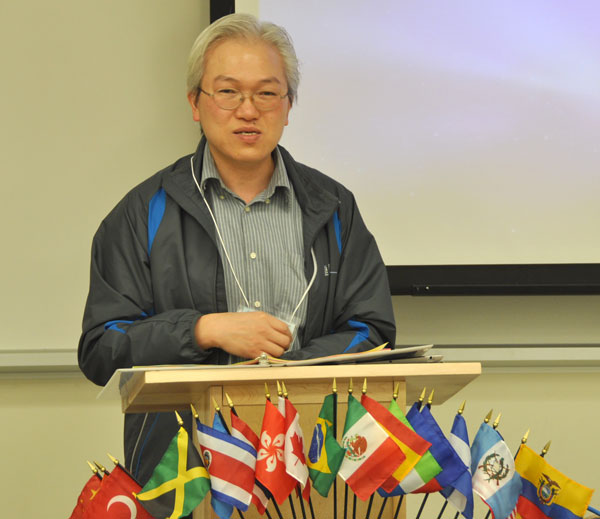03 Jun Glimpses of Hong Kong Conference

Rev. Yiu Kin Keung giving his report about the work of Hong Kong Conference during the past three years.
Rev. Yiu Kin Keung became superintendent of Hong Kong Conference in 2012. The previous superintendent, Rev. Ajiax Wo, stepped aside when he acquired a part-time teaching position. Rev. Wo continues part-time as pastor of the Yan Tze church, which he has been serving for almost 20 years.
Here are tidbits from the written and verbal reports given by Rev. Yiu to the 2013 General Conference meeting in Kitchener, Ontario, May 29-31. The report covers the years since the previous General Conference in January 2010.
The Churches
- The Hong Kong churches are fairly small. The largest church, Zion, has about 100 people. Most of the churches are located in large highrise buildings—one of them on the 27th floor. There may be several other evangelical churches in the same building.
- “We have not planted any new church in the past three years.”
- A few churches have shown a slight increase in attendance during the past three years, “but overall we are shrinking in size gradually.”
- Four churches, seeing the downtrend, reorganized with a cell group structure, but “all of them failed to make any significant growth in terms of size.”
- In 2011, Hong Kong Conference instituted a mandatory training program for deacons which includes two half-day seminars—the first on governing structure, core values, and United Brethren distinctives, the second on the dynamics of serving effectively as a team with pastors and fellow deacons.
- “We now have 12 fulltime pastors, 4 part-time pastors, and 2 retired pastors….Five of the fulltime and two of the part-time pastors were employed within the past three years.”
- “Most of our churches are not experiencing satisfying growth. The instability of pastoral staff is one of the major reasons. Nine fulltime pastors left us in the past three years. It is difficult to maintain a healthy church without a stable team of pastoral staff.”
- All of the Hong Kong churches are small churches established many years ago—some over 40 years old. Rev. Yiu pointed out that their small size means limited resources. Since these churches include people of diverse backgrounds and diverse ages—from babies through the elderly–it’s difficult shepherding them all on limited resources. “It is impossible to satisfy all the needs with the limited resources of a small church.”
- The pastors are discussing ways to combine their efforts, organizing joint functions and joint ministries between two or more congregations. “This would be a possible way to solve the problem of limited resources in small churches.”
Missions
During the past 25 years, they ministered in such places as Macau, Poland, Myanmar, Thailand, Nepal, and China. But for the near future, they decided to concentrate their resources in two places: Macau and Thailand.
- Macau: They are focusing efforts on helping the Living Stone church in Macau, which has struggled over the years. The Hong Kong pastors are helping to build up their ministry, organize a management committee, and guide the pastor and leaders to set vision, objectives, and strategies. Hong Kong Conference has arranged a mission trip to Macau for September 2013 “to support the worship and music ministry of Living Stone.”
- Thailand: “We have been invited by the Second District of the Church of Christ Thailand to start a new mission project in Chiang Rai City. The scope of work would probably include three areas: organizing English/Mandarin language learning program, training nursing staff at the Overbrook Hospital, and providing theological education and training.” The project will be a join effort of Hong Kong and Global Ministries (the US and Canada).
In addition, Hong Kong and Global Ministries signed a new “Memo of Understanding” in 2012 which clarifies their roles regarding Macau.

No Comments